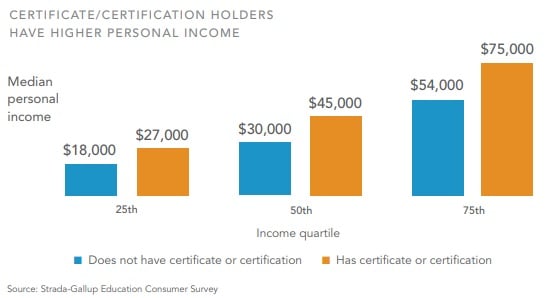You have /5 articles left.
Sign up for a free account or log in.
A nationally representative survey of roughly 50,000 working adults without college degrees found that respondents who hold a certificate or certification report higher levels of marketability, employment and income, although wages vary widely based on gender and occupational fields. Respondents also see themselves as more attractive job candidates, the survey found, and reported personal and subjective benefits from earning the nondegree credentials that go beyond labor-market returns.
The data come from the education consumer survey conducted by the Strada Education Network and Gallup. Strada and the Lumina Foundation this week released a report on survey findings about nondegree credentials.
“Through this new research, we’re seeing that not only do short-term credentials and certificates deliver an immediate impact for adults looking to upskill, but they also have the potential to foster the sort of wage increases needed to sustain a family and power true social and economic mobility," Carol D’Amico, executive vice president of mission advancement and philanthropy at Strada, said in a written statement.
Adults with a certificate or certification but no college degree have higher self-reported annual income levels than their peers with no college credential -- a median wage of $45,000 compared to $30,000. They also were more likely to be employed full-time.
However, as previous research has found, those wage gains vary significantly. On average, the survey found that the income premium for men with a certificate or certification was more than twice as large than it was for women. Respondents with nondegree credentials in male-dominated fields, such as security and protective service, construction, mining, architecture, and engineering, earn $19,000 more on average than those who do not hold such credentials. Likewise, several occupations with higher shares of women workers had small or no wage premiums for certificate or certification holders, including office and administrative support, education, training, and library services.





